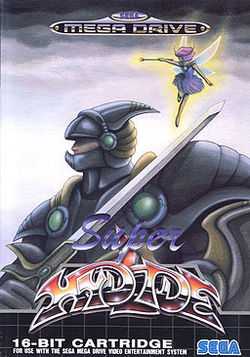Hydlide 3
| Hydlide 3 | |
|---|---|
 | |
| Developer(s) | T&E Soft |
| Publisher(s) | Seismic Software |
| Distributor(s) | Sega |
| Series | Hydlide |
| Platform(s) | MSX, MSX2, PC-88, Famicom, Mega Drive / Genesis, X68000 |
| Release date(s) | MSX
|
| Genre(s) | Action role-playing game |
| Mode(s) | Single player |
Hydlide 3: The Space Memories (ハイドライド3 闇からの訪問者 Haidoraido 3: Yami Kara no Hōmonsha) is an action role-playing game developed by T&E Soft and released in 1987 for the MSX (and separately for MSX2) and NEC PC-88, 1989 for the Nintendo Famicom and Sega Mega Drive (under the title Super Hydlide), and 1990 for the Sharp X68000. Before its Mega Drive release, it was called Hollo Fighter in some Sega advertising material and is notable as it was one of the first third party published titles to be released in the U.S, the other being Air Diver.
It is the sequel to Hydlide II: Shine of Darkness and part of the Hydlide series. During production of Scalebound, Platinum Games director Hideki Kamiya said he was inspired by Hydlide 3 on the PC-8801 MA along with Sorcerian.[1]
Story
Many years after the events of Hydlide II, an explosion of flames appeared near The City of the Woods. After that, enemies were everywhere. A young man is chosen to find the source of the evil.
Gameplay
The game incorporates a 'good/evil character' morality/alignment system. Like its predecessor Hydlide II: Shine of Darkness (1985), the player has a morality meter that can be aligned with either Justice, Normal, or Evil. The game has both good and evil monsters. Evil monsters attack the player character on sight, while good monsters only attack if the player character attacks them first. Killing any monster, good or evil, results in a reward of experience points, money, and occasionally a piece of equipment. However, if the player kills a good monster, points are lost from a statistic called "MF" (Moral Fiber). If the player's MF stat drops to zero, frequent traps will appear across the world. If the player manages to keep it over 100, rewards appear in the form of random items found around Fairyland. The player can also kill good monsters, which usually lowers the morality meter. Unlike Hydlide II, however, the morality meter no longer has an impact on the way in which the townsfolk react to the player.[2]
The game also features an in-game clock setting day-night cycles, where the character must eat two times a day and sleep regularly. If the characters fails to eat at a scheduled time or stays up past 11 p.m., his HP and attack power will begin to gradually drop. Staying at an inn will take care of both the character's sleep needs and all meals scheduled during his stay. Thus, if the character buys a room at an inn at 10:45, he will not need to purchase any rations. Meals taken during adventuring are taken care of by carrying food rations; if the character has an available food ration at a scheduled meal time (and is not staying at an inn), the food ration is automatically consumed, restoring some HP and averting hunger.
Another aspect of the game is the weight system. Every item in the game (including money) has weight. If the total weight of items the player character carries exceeds his "Load Capacity" (LC), he will move much more slowly. The game also makes use of cut scenes for the opening and ending, a combat system that is similar to Ys, the choice between four distinct character classes (with the Fighter and Thief being melee with minor spell access, while the Monk and Cleric are more adept spell casters), and a wide variety of equipment and spells.
References
- ↑ http://www.polygon.com/a/life-in-japan/Hideki-Kamiya-Scalebound
- ↑ Kurt Kalata & Robert Greene, Hydlide, Hardcore Gaming 101